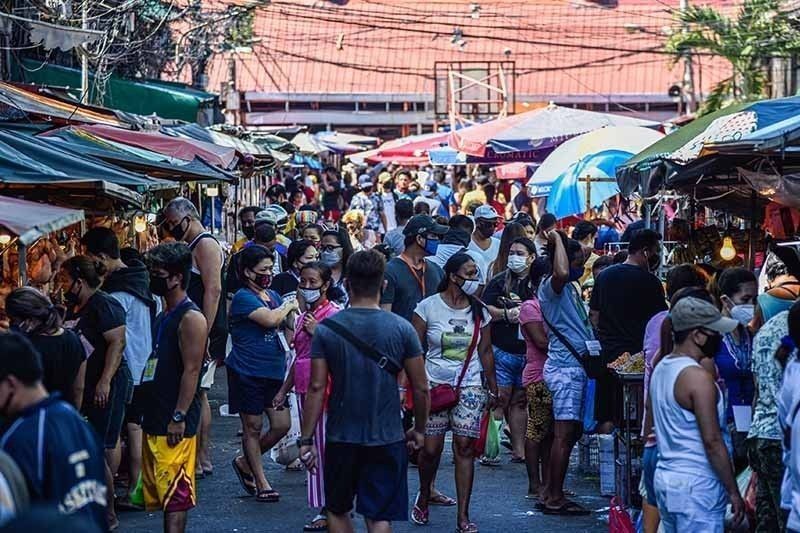Philippines can't risk full shift to MGCQ by March, OCTA member warns

MANILA, Philippines — An OCTA Research member has rejected the imminent shift of the entire country to the lowest quarantine status pushed by administration officials, warning that the risk of surge in infections remain which could send the nation again to hard lockdown.
The idea of downgrading all areas to modified GCQ by March, which will include Metro Manila, had been suggested by National Economic Development Authority's acting chief Karl Chua, who cited the need to address hunger and income losses from already the world's longest quarantine, which will mark a year next month.
It would later on earn support from the Palace as well as House Speaker Lord Allan Velasco, who both stressed the need for an economic recovery yet not presenting science to back the move, despite the country still reporting more than a thousand new coronavirus cases a day.
On Wednesday, Prof. Guido David told DZBB that making the decision could lose the Philippines a "semblance of control" to prevent possible surges.
"Gusto natin ng approach na gradual kasi 'yun yung ginagawa natin since October," he said. "Parang careful tayo kasi kahit okay ang kalagayan natin ngayon...andiyan pa rin lagi 'yung risk...syempre 'pag hindi nangyayari, parang ang pakiramdam natin wala naman."
(We want a gradual approach on things because that's what we've been doing since October. We are careful because even if our situation is stable at present, the risk is always there. Of course, when it's not happening, we feel as if it is no longer there.)
David's group, composed of experts from the academe, had been releasing its forecasts on the country's coronavirus situation since April 2020. Their outputs had been significant at a time when government's pandemic response had been highly criticized and often questioned if its policies are based on science.
Despite this, the group's recommendations were often shunned by the administration, even going so far as the Palace telling them keep their forecasts in private to not preempt the president's decision making.
To date, much of the country is already under MGCQ, with only the capital region, Batangas, Abra, Davao City, Davao del Norte, Lanao del Sur and Iligan under GCQ, where about half of industries can operate.
David, drawing an example, said from among three major metropolitan areas in the country -- Metro Manila, Metro Cebu and Metro Davao -- one under MGCQ that is Metro Cebu, has seen a post-holiday increase in infections.
NCR and Metro Davao, meanwhile, saw a slight surge after the holidays, but were mitigated as they remained under GCQ.
"So dahil under MGCQ, nahirapan tayo pigilan," he said. "Okay 'yung kalagayan nung Cebu noong December, ngayon Cebu City pa lang 200 cases per day na."
(Because Metro Cebu was under MGCQ, we had difficulty contaning the surge. Its situation was still okay in December 2020, but now Cebu City alone has 200 more cases a day.)
Philippine coronavirus infections by February 17 stood at 553,424, as health officials reported 1,184 additional cases and 11,577 deaths in total.
This count remains the second highest in Southeast Asia, and the COVID-19 variant first detected in the United Kingdom, feared to be more infectious, has reached the country's shores.
The OCTA member said that while they respect the need to jumpstart the economy, the Philippines should more importantly balance it with the risk that comes with reopening more.
"Ang ayaw din naman natin is 'pag magkaroon ng pagtaas ng bilang ng kaso, mapipilitan tayo bumalik sa ECQ o MECQ," David said. "Ayaw na natin bumalik doon kasi mas mostly 'yun sa ekonomiya...may possibility na mangyari 'yun 'pag nag-take tayo ng masyadong malaking risk."
(What we don't want is if there is a recorded increase in cases, we will be forced to return to ECQ or MECQ. We don't want that because that is more costly to our economy. But there is the possibility for it to happen if we take a much bigger risk.)
The Philippines was first placed under community quarantine on March 17, 2020, with the lockdown's economic and social impact still being felt to date.
And while the administration has sought to hype vaccine-related developments that would be crucial to a possible reopening, it has yet to sign supply deals with foreign drugmakers with officials giving an indicative date and later on saying there is nothing definite yet.
- Latest
- Trending
































